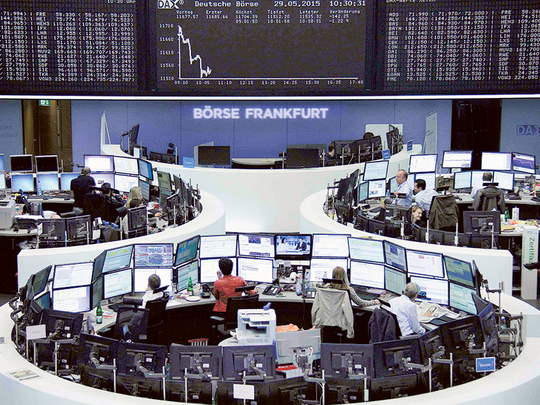
International markets have been pretty quiet on the whole in the past week, with the critical issues of the US-led interest-rate outlook, China’s moderate slowdown, a rebalancing of oil prices and Europe’s existential deliberations over Greece not sparking immediate alarm. Gulf bourses and credits have been barely any different.
Of course it is the Greek impasse that has appeared the most threatening issue in the short term, and that might still be salvaged. There was always good reason to suppose that some kind of compromise deal would be found, even if the underlying fracture needs a lot more than a sticking plaster.
The Greeks apparently want to keep the euro, though they haven’t wanted to pay the price, while the Germans and others really don’t want Greece falling overboard. This dance-macabre, like the mythical Hotel California, doesn’t cater for anyone leaving, as that would show that the planned progression to European political union can actually be escaped.
It would be heartening to be wrong in carrying that cynicism, but anecdotally, you do have to wonder how far removed the shenanigans of the political class are from the real undercurrents.
“You would never think this is a country in crisis,” said my neighbour at the airport gate in Athens recently, viewing the hordes clambering through passport control and bustling through the duty-free outlets. As everyone knows, Greece certainly has a competitive offering in its tourist trade. It just doesn’t have a particularly competitive currency, or indeed one that reflects the general state of its economy — although quantitative easing and policy ructions have actually set about mollifying that condition. The weakening euro is helping keep the continent afloat.
“There’s no shortage of money in Greece,” suggested my taxi driver. “It’s only the government that’s broke; the money’s all offshore”, he ventured, referring not only to those who have removed their funds from the potentially rapacious grasp of EU apparatchiks, following the example of Cyprus two years ago, but also to the shipping industry both parked beyond the state’s clutches under the country’s constitution and liable simply to re-flag if there were any sniff of being tapped for taxes.
Well, we’ll all see what transpires very soon, and global stocks may remain nervous until the game of brinkmanship is over and some time bought until the next challenge emerges.
If the market mood has held together somewhat on that front, the rise of the anti-austerity populists in regional elections in Spain, the advent of a nationalist Polish president, Britain’s diplomative offensive to renegotiate membership terms in the EU, and French and German plans to deepen integration by harmonising corporate taxation all show plenty of stirring of the melting pot of interests that trouble Europe these days — grabbing attention from the US, China, Japan and the emerging markets.
For the medium term, Europe politically may well remain in the headlines, giving more for investors to think about. Spain’s evolution, though, bears an economic policy twist in the making, one that goes to the heart of how the euro is meant to function.
The currency has already undergone the (somewhat delayed) indignity, as some would view it, of debasement by accelerated printing press. Now a proposal has come from Madrid that the European Central Bank should amend its strategic raison d’etre — quite radically, in fact — to take unemployment into account as much as inflation when setting monetary policy.
This is the so-called dual mandate which is the responsibility in the US of the Federal Reserve, and a topic worthy of extended consideration in its own right. Suffice to say here that, while it would very much be favoured by the nations on the southern periphery of Europe, implying laxer policy, the northern core would be seriously disinclined to dent the commitment to price stability currently governing the ECB’s actions.
In a nutshell, that would suggest a belief in a Keynesian trade-off between growth and inflation that the dominant German monetarist camp simply has no time for. And they have a point. The lessons of the 1930s were superseded by those (substantially contrary) of the 1970s, though much less appreciated. Which is to say that recessions can’t always be avoided, and busts that follow booms based essentially on easy money can’t seriously be cast off by more of the same.
Endless waves of monetary and fiscal stimulus seem mostly to have exaggerated the world’s aggregate debt load, whereas the necessary switch from demand-sided to supply-sided remedies (a much harder task unbeloved of both governments and populations) receives lip-service by comparison.
For the observant investor, it’s a sign that the tensions over sustainable policymaking are increasingly evident, particularly in Europe, tending to weaken the case for the euro and its exchange rate over the longer term.
The US dollar is correspondingly underpinned. Otherwise, the omens don’t look so great anywhere among the mainstream economic blocs, and investors should tread warily.












